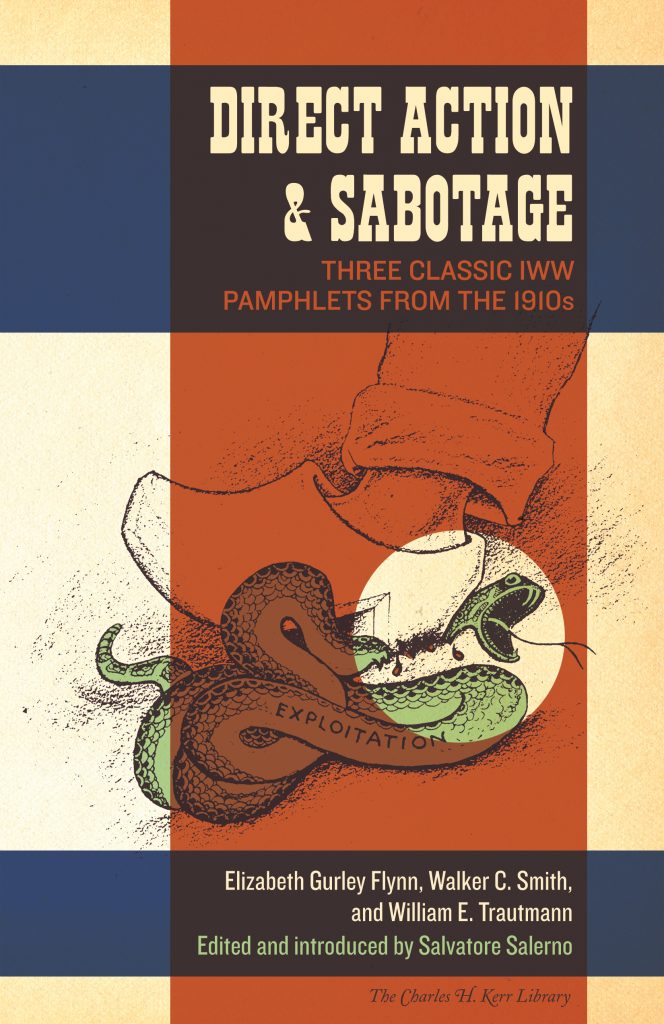By Benjamin Franks
Anarchist Studies
August 2017
Elizabeth Gurley Flynn, Walker C. Smith & William E. Trautmann, Direct Action & Sabotage: Three Classic IWW pamphlets from the 1910s, Salvatore Salerno (ed.)
Chicago: C.H. Kerr and Oakland, CA: PM Press, 2014; 116pp; ISBN 9781604864823
The volume is made up of three pivotal texts from the early period of the Industrial Workers of the World (IWW) written by William E. Trautmann, Walker C. Smith and Elizabeth Gurley Flynn. It is supplemented with IWW illustrations from the period, a contemporaneous supportive note from the novelist Jack London and a well-informed introduction by Salvatore Salerno that helpfully contextualises the trio’s pamphlets. The three central texts demonstrate the importance of direct action to revolutionary syndicalist organisation and to sites of struggle beyond industrial production. These overlapping, accessible pamphlets provide important insights into the theoretical underpinnings and practical applications of direct action and sabotage. Support for workers’ direct action and sabotage marked the schism within the wider labour movement. The craft unions and social democratic American Federation of Labour opposed it, for the reasons that the revolutionary syndicalist IWW advo- cated it: direct action places power into the hands of the individual worker, removing reliance on intermediaries like political parties and union negotiators.
Whilst these texts contain occasionally naïve consequentialist justifications for direct action (pp34, 67), all the authors then point to the immanent goods of industrial direct action: the embodiment of moments of solidarity and transcendence. Direct action assists in, and embodies, the development of transformative social organisation. The pamphlets thus highlight how sabotage is not only reactive – a response to the specific, repressive actions of the bosses and their agents – but also prefigurative of future social relations.
The diversity and creativity of direct action is highlighted by the three authors, as such methods include machine-breaking, over- and under-contamination (the former to highlight how capitalists damage goods and customers’ health in the search of profit), strikes, go-slows, work-to-rules, and informing the public about the true contents of the goods they buy. Such diverse methods require complex, often informal, structures of support, which then encourage greater acts of solidarity against capitalist values of profit maximisation and the supremacy of property rights. Thus the three pamphlets – but especially Smith’s – pre-empt the autonomist Marxist concept of autovalorisation, by highlighting how workers through direct action create their own values and social relations separate to – and against – those of capital. By contrast, reformist bodies, like the Knights of Labour, which channel opposition into representational hierarchies, produce inert social actors and regressive institutions.
Flynn applies the notion of sabotage in her discussion of women taking control over their own bodies – challenging their sexual and reproductive role under capitalism – and thus extends the focus of class struggle well beyond the site of industrial production. She identifies how this radical (and, in many states, illegal but pervasive) micro-politics prioritises women’s interests over the commercial pressure to supply workers. This politics of the body anticipates post-structural considerations by over half a century.
Salerno’s introduction does include a small, but significant, theoretical idiosyncrasy. It situates ‘direct action’ as ‘non-violence’, because, he claims, it rejects life-threatening terrorism or personal injury. This is especially odd as none of the authors absolutely rule out physical harm to the oppressors. Indeed Trautmann gives examples of what he considers to be life threatening – and indeed life-ending – justified direct action and extends his definition to include some acts of individual terror (pp35-8). Despite this minor quibble, this is an exhilarating collection of texts, which will delight anyone who faces the managerialist oppressions and humiliations of daily life – such that even toilet breaks are timed and quantified. As these texts joyfully identify, sabotage is (possible) everywhere and provides the basis for richer, freer humane relations.
Back to Elizabeth Gurley Flynn’s Author Page | Back to Walker C. Smith’s Author Page | Back to William E. Trautmann’s Author Page | Back to Salvatore Salerno’s Editor page







